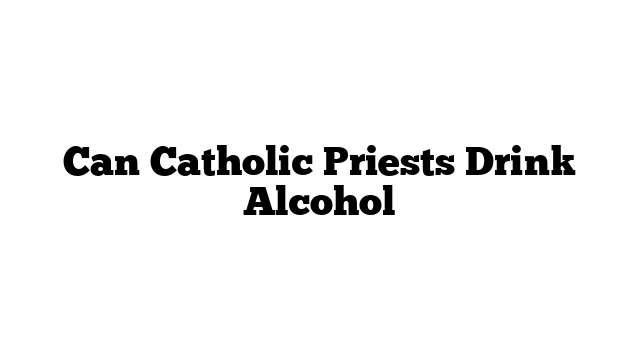Miscellaneous
Can Catholic Priests Drink Alcohol?
When it comes to the topic of Catholic priests and alcohol consumption, there seems to be some confusion and varying opinions. To clarify this matter, let’s explore the Catholic Church’s stance on alcohol and whether priests are permitted to consume it.
The Catholic Church’s View on Alcohol
The Catholic Church recognizes that alcohol itself is not inherently sinful. In fact, wine is an important part of the Catholic sacrament of the Eucharist. Jesus himself drank wine and even performed the miracle of turning water into wine at the wedding in Cana. Therefore, the Church considers alcohol to be a gift from God, meant to be enjoyed in moderation.
However, while alcohol is not regarded as sinful in itself, the Church acknowledges that excessive alcohol consumption can lead to sinful actions and behavior. Drunkenness, for instance, is considered a vice, as it impairs a person’s ability to act with reason and judgment. Therefore, Catholics are encouraged to consume alcohol responsibly and in moderation, avoiding excessive drinking.
Can Catholic Priests Drink Alcohol?
The short answer is yes, Catholic priests can and are allowed to consume alcohol. Like any other adult, they have the freedom to make choices regarding alcohol consumption. They are not required to abstain from alcohol altogether unless they have taken a personal vow of abstinence or have health-related reasons to do so.
It’s important to note that priests are held to a higher standard by virtue of their vocation and must exercise prudence and self-control in their actions and behaviors, including their alcohol consumption. They are expected to be responsible role models for the faith community they serve and should refrain from excessive drinking or any behavior that may give scandal.
Priests and Responsibility
While Catholic priests are permitted to enjoy alcohol in moderation, they must be mindful of their responsibilities. They are expected to prioritize their spiritual duties and be available to those in need. Drinking to excess, becoming intoxicated, or engaging in reckless behavior that may compromise their ability to fulfill their sacramental duties would be considered a violation of their responsibilities and the Catholic Church’s teachings.
It is worth mentioning that, like any other group of individuals, priests vary in their personal choices and attitudes towards alcohol. Some may choose to abstain entirely, while others may enjoy an occasional drink. Ultimately, it is up to the individual priest to decide how they will approach alcohol within the boundaries set by the Church and their own conscience.
Conclusion
In summary, the Catholic Church does not prohibit priests from consuming alcohol. However, they are expected to exercise prudence and self-control when it comes to drinking, avoiding excessive consumption and the impairment of their mental faculties. Catholic priests, like any other individuals, are called to live a balanced and virtuous life, recognizing that alcohol, when consumed responsibly, can be enjoyed as a gift from God. The focus for priests is to serve their faith community and be responsible representatives of the Church, promoting love, compassion, and self-discipline.

